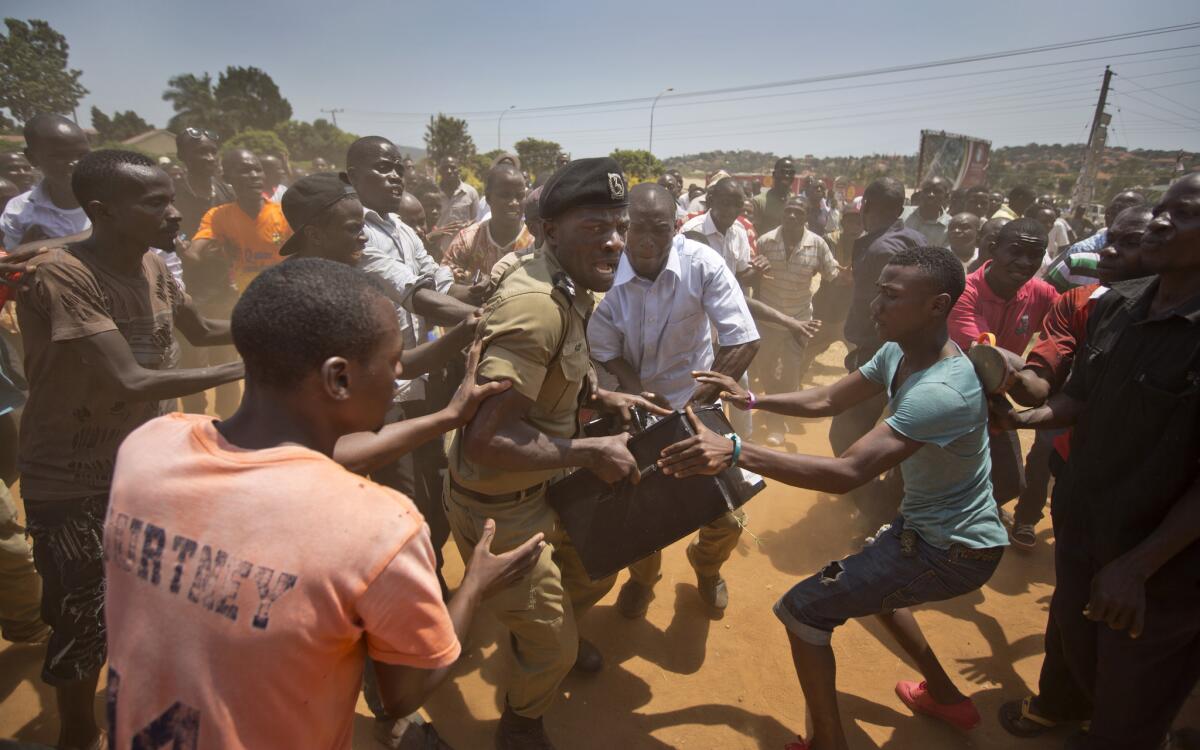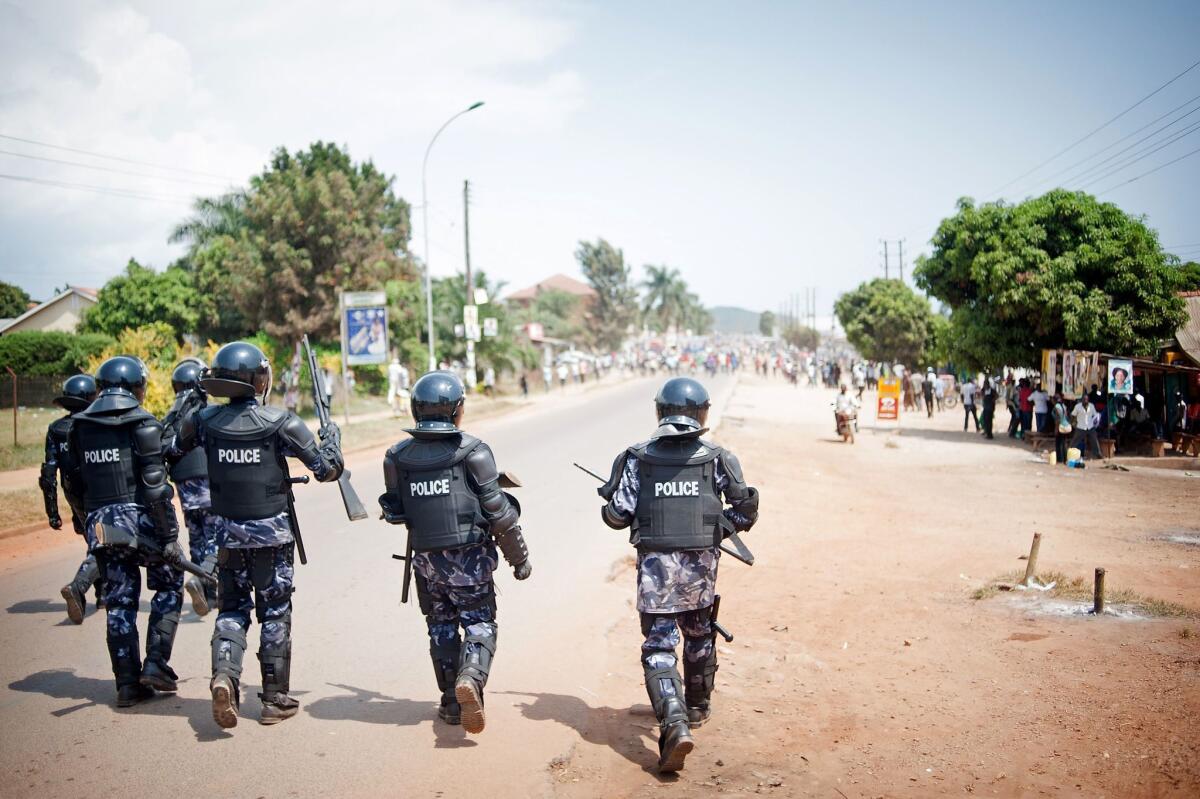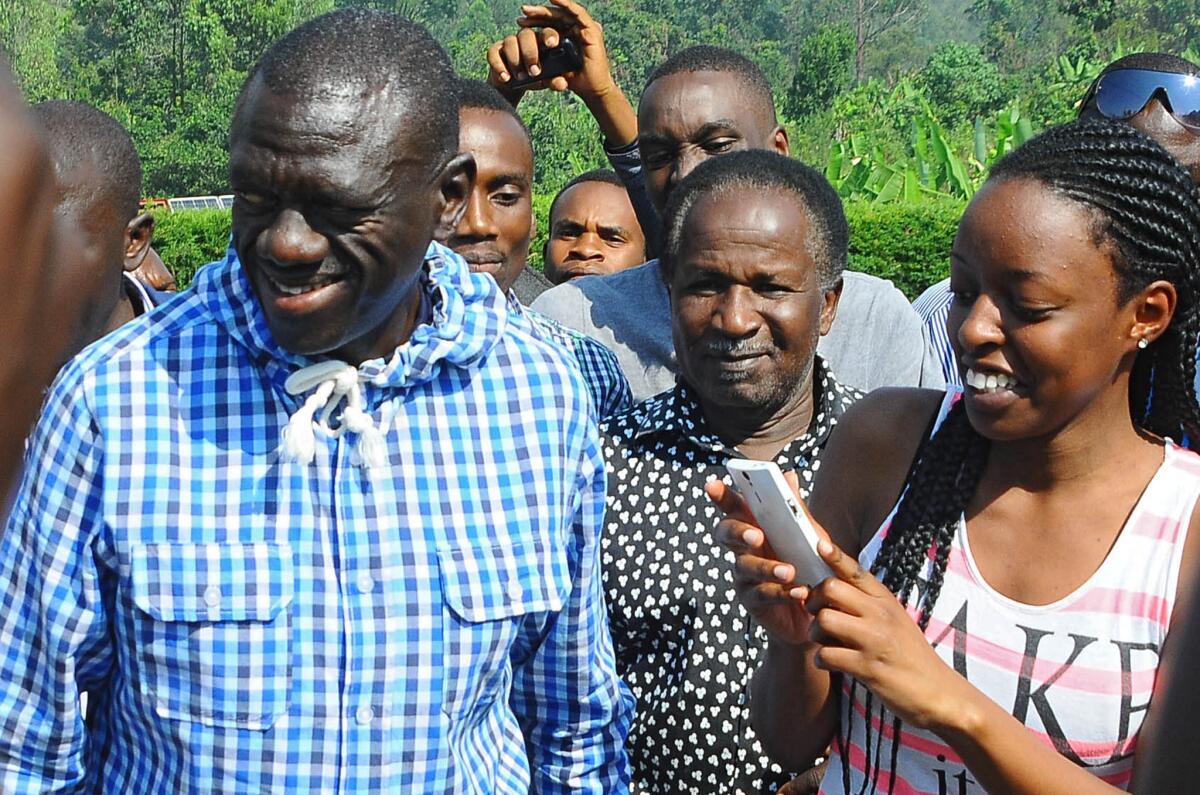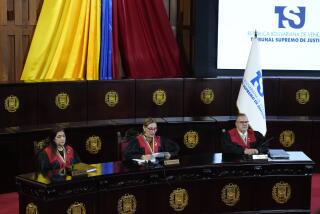Election day in Uganda: Tear gas fired, opposition leader detained, social media shut down

A Ugandan policeman struggles to keep his hold on a box containing voting materials, as excited voters surround him after waiting for hours to cast ballots in Ggaba.
Even by African standards, it was a most unusual election.
In Uganda’s presidential and parliamentary vote Thursday, Twitter, Facebook and WhatsApp were disabled by the government for “security reasons.”
The main presidential challenger was whisked away by police. And police fired tear gas at angry voters who protested after having to wait in line for hours because of lengthy delays in the delivery of voting materials.
Such is Ugandan democracy under President Yoweri Museveni, a ruler who “typifies [an] African autocrat who uses controlled elections to feign democrat,” Human Rights Watch director Ken Roth tweeted Thursday.

Riot police advance toward a crowd of opposition supporters in the centre of Ggaba, a suburb of Kampala, on Thursday during Uganda’s national elections.
Museveni, 71, has been in power for 30 years and like many leaders in Africa and elsewhere, seems unable to imagine that anyone would make a better president than him.
After casting his vote Thursday afternoon, he told journalists the decision to close down social media was a temporary security measure because “some people misuse those pathways for telling lies.”
Cellphone money transfers, a popular means of payments, were also disabled. However, some Ugandans took to Twitter and Facebook to taunt authorities that they had been able to get around the social media shutdown by using VPNs.
“Hello world ~ UCC tried to shut us all up, but I guess they didn’t account for VPNs :) :),” tweeted lawyer Busingye Kabumba, referring to the Ugandan Communications Commission.
“Blocking people’s right to communicate on this important day sends wrong message to Ugandans,” tweeted the U.S. ambassador to Uganda, Deborah R. Malac.
Uganda’s vote underscores the patchy progress on democracy in Africa and elsewhere.
Some of the African leaders once seen by Washington as a hopeful new generation of democrats -- including Museveni and President Paul Kagame in neighboring Rwanda -- have turned out to be as bad as the old guard of Africa’s “Big Men” who ruled for life.
One African leader after another has engineered changes to constitutional term limits to stay in power, claiming that supporters are clamoring for them to stay.
Among those who have been in power for decades are Zimbabwe’s Robert Mugabe, who turns 92 on Sunday, Cameroon’s Paul Biya, Equatorial Guinea’s Teodoro Obiang Nguema Mbasogo, and Angola’s Jose Eduardo dos Santos, all of whom have been in power for more than 30 years.
MORE: Get our best stories in your Facebook feed >>
But there have been encouraging signs elsewhere, particularly in West Africa. Nigeria last year saw its first democratic transfer of power since the end of military rule in 1999, while attempts by presidents to cling to power in Senegal and Burkina Faso have been foiled by public protests.
In Uganda, however, Museveni maintains firm control of the levers of power and is expected to win yet another five-year term.
Museveni, whose election slogan is “Steady progress,” faces seven presidential candidates, including his former doctor, longtime opposition leader Kizza Besigye, and his former prime minister, Amama Mbabazi, both of whom have declared that the balloting will be rigged, setting the scene for disputed elections and protests.
Besigye’s Forum for Democratic Change party said he had been arrested late Thursday “and we do not know where he is.” (Hours later, his attorney said he had been released.) According to the party, Besigye had been trying to expose a house being used by ruling party operatives to rig votes.

Ugandan opposition leader Kizza Besigye meets his supporters after casting his vote. He was briefly detained by authorities.
It was the second time in a few days that Besigye was held by police. He was briefly detained Monday when he tried to attend an election rally in the Ugandan capital, Kampala.
The elections were marked by long delays and claims of election fraud. The opposition tweeted photographs of what they said were pre-marked ballot papers in favor of Museveni, while local media tweeted photographs of ballot boxes that reportedly weren’t sealed and may have been tampered with.
Former Nigerian President Olusegun Obasanjo, head of a Commonwealth election observer mission, described the delays in getting voting materials to polling stations as “absolutely inexcusable,” adding that these “do not inspire trust and confidence in the system and the process,” Agence France-Presse reported.
Police fired tear gas to disperse protesting voters angered by the delays. Uganda’s election commission apologized for the problems delivering ballot papers, and voting was extended in some places to Friday to allow people to vote.
Museveni needs more than 50% of the vote to avoid a runoff, something he’s never faced in his three decades as president.
See the most-read stories this hour >>
Human rights groups have reported a clampdown by police on opposition rallies in the months leading to elections. A Ugandan human rights organization, Chapter Four Uganda, recorded 72 incidents in which police and others violated rights to freedom of assembly.
Human Rights Watch reported threats by ruling party figures, including one official, Kasule Lumumba, who was recorded as saying the state “will kill your children” if people tried to protest results after the poll.
“Sadly, this is no idle talk. Human rights groups have documented cases of people, including children, killed by security forces during public demonstrations in Uganda in recent years,” Human Rights Watch researcher Maria Burnett said in a statement.
Results in Uganda’s vote are expected to be announced by Saturday.
Follow @RobynDixon_LAT for news from Africa.
ALSO
Drug seizures soar in China; most suspects are ‘farmers and unemployed’
Pope opens the door to contraception in averting harmful effects of Zika virus
Haiti’s troubled succession of leaders: ‘They don’t really want to work for the Haitian people’
More to Read
Sign up for Essential California
The most important California stories and recommendations in your inbox every morning.
You may occasionally receive promotional content from the Los Angeles Times.









